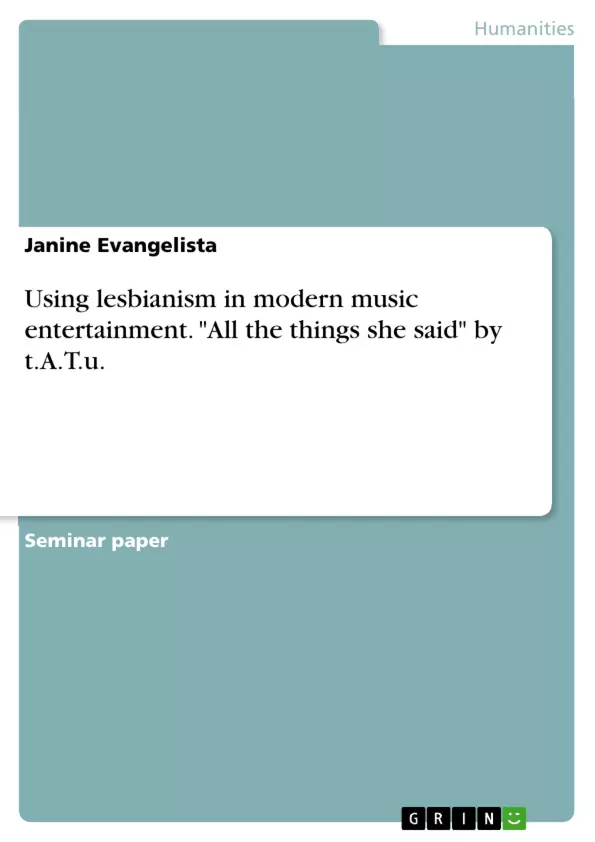Passionate kisses, provocative performances on stage, whimsical and crazy - those are, among others, the notions connoted to the Russian Pop Duo t.A.T.u., which gained a lot of popularity in the beginning of the 2000s. The band consists of Lena Katina and Julia Volkova who both still have been underage when their career reached its climax; hence it caused a lot of polemic discussions worldwide. They gained the attention of several theorists of Queerism because in their songs and music videos, t.A.T.u. is fighting against society's apparent intolerance of homosexuality.
Queer Theory deals with the difficult issue of defining oneself as homosexual, e.g. the process of 'coming out', and therewith being often confronted with society's intolerance. It also discusses the process of self-discovery and building an own identity and comes along the obstacles people have to overcome in order to lead a happy life, integrated and tolerated by society. Music was used in several ways to depict the problems of coming out as homosexual. Therefore, it is said in a proposition in Playing it Queer by Jodie Taylor that, "Music allowed me to perform gender and express sexuality in multiple ways that were unavailable to me in daily life. […]".
Nevertheless, the manner that t.A.T.u. used became reason for great discussion among society. Since their first song All The Things She Said had been published, critics questioned the truth behind the affection between Lena Katina and Julia Volkova. Therefore, this term paper aims to ask for t.A.T.u.'s purpose of using the issue of homosexuality in their music. Either there really was the aim of explaining how to get through the process of coming out and then living as homosexual person or t.A.T.u. was just using that image for commercial purposes and branding.
Table of Contents
- Introduction
- The Queer Theory by Adrienne Rich
- Analysis of the Song All The Things She Said by t.A.T.u.
- All The Things She Said - Lyrics
- All The Things She Said - Music Video
- Comparing t.A.T.u.'s purpose: image or self-discovery
- Conclusion
Objectives and Key Themes
This term paper examines the purpose behind t.A.T.u.'s use of homosexuality in their music. It aims to determine whether the group sought to convey the challenges of coming out and living as a homosexual person or if they simply utilized the image for commercial purposes and branding.
- The Queer Theory and its implications for understanding female sexuality.
- The role of music in expressing sexuality and challenging societal norms.
- The impact of t.A.T.u.'s provocative performances and lyrics on societal perceptions of homosexuality.
- The relationship between artistic expression and commercial success in shaping t.A.T.u.'s image.
- The complexities of self-discovery and identity formation in the context of societal expectations and limitations.
Chapter Summaries
- Introduction: The introduction outlines the context of t.A.T.u.'s rise to fame and the controversy surrounding their portrayal of homosexuality. It also introduces the main research question: whether t.A.T.u.'s use of homosexuality was genuine or simply a commercial strategy. The chapter also mentions Adrienne Rich's Queer Theory, which will be discussed in the next chapter.
- The Queer Theory by Adrienne Rich: This chapter examines Adrienne Rich's "Compulsory Heterosexuality and Lesbian Existence," focusing on her arguments regarding the inherent nature of heterosexuality and the historical oppression of female sexuality. Rich's theory will be applied to analyze t.A.T.u.'s song and music video.
- Analysis of the Song All The Things She Said by t.A.T.u.: This chapter analyzes the lyrics and music video of t.A.T.u.'s hit song "All The Things She Said." The analysis will explore the song's themes, its potential impact on listeners, and how it reflects the ideas presented in Rich's Queer Theory.
Keywords
The main keywords of this work include: Queer Theory, Adrienne Rich, t.A.T.u., homosexuality, self-discovery, identity formation, music and sexuality, commercialization of image, societal expectations, and artistic expression.
- Quote paper
- Bachelor of Arts (B.A.9 Janine Evangelista (Author), 2016, Using lesbianism in modern music entertainment. "All the things she said" by t.A.T.u., Munich, GRIN Verlag, https://www.hausarbeiten.de/document/415819


